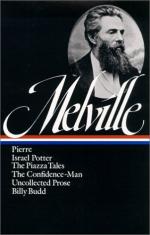It was on Copps’ Hill, within the city bounds, one of the enemy’s positions during the fight, that our wanderer found his best repose that day. Sitting down here on a mound in the graveyard, he looked off across Charles River towards the battle-ground, whose incipient monument, at that period, was hard to see, as a struggling sprig of corn in a chilly spring. Upon those heights, fifty years before, his now feeble hands had wielded both ends of the musket. There too he had received that slit upon the chest, which afterwards, in the affair with the Serapis, being traversed by a cutlass wound, made him now the bescarred bearer of a cross.
For a long time he sat mute, gazing blankly about him. The sultry July day was waning. His son sought to cheer him a little ere rising to return to the lodging for the present assigned them by the ship-captain. “Nay,” replied the old man, “I shall get no fitter rest than here by the mounds.”
But from this true “Potter’s Field,” the boy at length drew him away; and encouraged next morning by a voluntary purse made up among the reassembled passengers, father and son started by stage for the country of the Housatonie. But the exile’s presence in these old mountain townships proved less a return than a resurrection. At first, none knew him, nor could recall having heard of him. Ere long it was found, that more than thirty years previous, the last known survivor of his family in that region, a bachelor, following the example of three-fourths of his neighbors, had sold out and removed to a distant country in the west; where exactly, none could say.
He sought to get a glimpse of his father’s homestead. But it had been burnt down long ago. Accompanied by his son, dim-eyed and dim-hearted, he next went to find the site. But the roads had years before been changed. The old road was now browsed over by sheep; the new one ran straight through what had formerly been orchards. But new orchards, planted from other suckers, and in time grafted, throve on sunny slopes near by, where blackberries had once been picked by the bushel. At length he came to a field waving with buckwheat. It seemed one of those fields which himself had often reaped. But it turned out, upon inquiry, that but three summers since a walnut grove had stood there. Then he vaguely remembered that his father had sometimes talked of planting such a grove, to defend the neighboring fields against the cold north wind; yet where precisely that grove was to have been, his shattered mind could not recall. But it seemed not unlikely that during his long exile, the walnut grove had been planted and harvested, as well as the annual crops preceding and succeeding it, on the very same soil.




